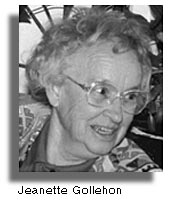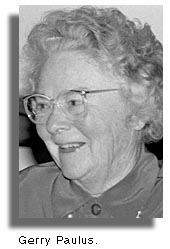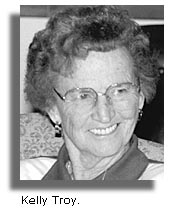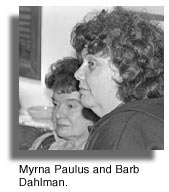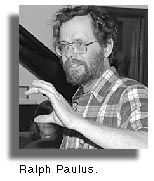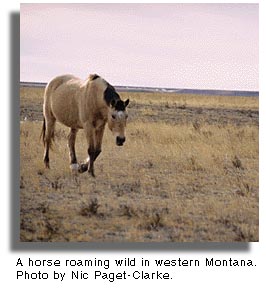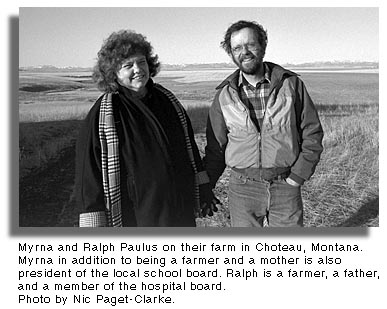 Ralph and Myrna Paulus are farmers who live in the Montana community of Choteau, population 2,000. They are also key participants in the American Festival Project bringing artists to Choteau and developing storytelling, poetry and theater among the people of Montana. In cooperation with the eastern Montana community of Fort Peck, they are collecting local stories as material for plays which they will perform in their hometowns and in each others' community. The following interview was conducted for the American Festival Project by Nic Paget-Clarke. It is re-published here with permission.
Ralph and Myrna Paulus are farmers who live in the Montana community of Choteau, population 2,000. They are also key participants in the American Festival Project bringing artists to Choteau and developing storytelling, poetry and theater among the people of Montana. In cooperation with the eastern Montana community of Fort Peck, they are collecting local stories as material for plays which they will perform in their hometowns and in each others' community. The following interview was conducted for the American Festival Project by Nic Paget-Clarke. It is re-published here with permission.
Story Circle
In this article there are photos of Choteau story circle members. From top to bottom they are: Jeanette Gollehon, Mike Morris, Gerry Paulus, Sarah Cobb, Kelly Troy, Ralph Paulus and Barb Dahlman, and Myrna Paulus. They all came together for a pot luck and story swap in January 1995 at the Paulus' farm house near Choteau. All photos by Nic Paget-Clarke.
NPC: What started you bringing artists to Choteau?
Myrna: We had Norman Luboff's choir come. Norman Luboff is a choir director and choral music arranger quite famous on the international scene.
Ralph: There was a level of excitement and intimacy in the auditorium because they just sang their socks off. We had a potluck dinner and when they got done I heard this interchange going, the singers and people are all mixed up and it was just magic. I don't think there was a dry eye in the house when they got done. I mean these are real people. They got kids and they're divorced and they got problems and they ain't no different than us, and if we put our mind to it we could do what they're doing.
NPC: How did you start working with the American Festival Project?
Ralph: How do you go about finding artists? I don't know, I'm a farmer. I didn't go to art school, I don't know anybody at the university to call. But this looked really attractive, so I went and got involved, and Arnie (Malina) got us going and jeez, that made all the difference in the world.
He got us involved with the Westaf artists, Maria Benitez and Danny Berchevsky Jazz Dance. We did some pretty racy things for out here in the boondocks. And it worked. I mean it pushed out on the envelope, and it was OK, we got through it, the audience accepted it.
NPC: What does it mean to pick artists for rural communities?
Ralph: Picking things that they'll like, so they'll want to come back. We're into what I think was our original intent. Here's an opportunity for us to dig in and send something back. The communication is two ways. I think that to me is the most important part of what it is we're establishing. We're getting involved in going into our community and finding what's there and trying to connect that up with the rest of the world.
Myrna: I think it relates to the community because we end up finding out that our problems, although they may be totally unique to us - there's someplace else that has a problem that's similar. People, despite what may be their ethnic background, we all have similarities.
Ralph: I went to New Orleans (for an American Festival meeting) and met with Ann Brown (from Mississippi). She's in her community struggling with lots of the same things we are. Ann Brown's is an agricultural community that has lost control of their own destiny, and likewise we are an agricultural community that's lost control of our own destiny. We're all white here, they're all black there. We're not in anywhere near as bad a shape as they're in, I'm sure. But we're in the process of losing control. There's a connection that's been made there. I don't know that I can do her much good but she sure did me a lot of good.
NPC: Can you describe what happened when Adella Gautier and John O'Neal of Junebug Productions came to town?
Ralph: Adella did kindergarten and she had a session with first, second and third grade all coming to the auditorium, and told stories. Afterwards she got down and talked to the kids.
Myrna: They loved her ...yeah, made sure her color didn't come off. For some of the kids, she was the first black person they'd ever seen other than on TV. She said, "You guys know where I came from?" A lot of them said, "Africa?" And she said, "No, I came from New Orleans." The way she handled it, she's wonderful with kids. She's really quite spectacular.
Last year Junebug Jack did a performance for the 7th through 12th graders, and the freshmen and the juniors did some of their stories, performed for each other, and ended with some music. Carl was playing his guitar, and the auditorium was just kind of welcoming there. The kids that were in there were having a good time and the bell rang for school and nobody left.
School was over with and the kids that were in the auditorium were still there, and the auditorium door just plastered with kids looking in wishing they were inside. That was a really neat exchange to watch. Adella was singing, she even had Ralph's cousin up dancing. It was kind of a neat melding. It was like the kids were really part of the group and the group was really part of the kids.
NPC: Tell me one of your favorite stories.
Myrna: Mike was telling it one night at one of our meetings. He was telling how his great-grandparents came to this area from Czechoslovakia; and they didn't homestead, they squatted down between Choteau and Augusta. They built just board shacks to live in and the men would go away for weeks at a time and work in the coal mines. The women stayed in those little shacks down on the river, because if they could live there a year and nobody booted them off, then they could claim the land, and they didn't have to file as a homesteader. The big, joyous occasion was when the men came back with a load of coal, so they could burn coal in the stoves instead of wood. My God, the hardships. ... Those women had the children there. The wind blows fiercely down along the river, and they had nothing on the walls. It was just boards nailed together. There's even holes, they could see outside. The men took off for the mines. And they stayed ... they stayed with those men that would go off and do that.
NPC: How would you describe the interaction of farming and this cultural activity?
Myrna: It's compatibility. There is a sense of unsureness in being farmers. But there is a sense of joy at the completion of a task, such as when the seeding is done. It's not just a sense of accomplishment, it's a sense of joy. There's that same thing at harvest. It's a tremendous working experience. It's a unifying experience.
Ralph: I used to think that art and farming had nothing to do with each other. That's why I did it because I thought it had nothing to do with farming. But it has everything to do with farming. And in a sense art is more agriculture than agriculture. And the leverage, too; you put the boar in with the sows. You didn't do much, all you did was open the gate. You run a couple of boars in there, and you got maybe a dozen sows, and in three months you got a mess. In another six months you've got 20,000 lbs. of pork to deal with, just from opening that gate. And that's the way this art stuff is. We're planting seeds, who the hell knows what's going to take off.
NPC: How does art relate to democracy?
Ralph: You have to feel good about yourself to stand up for what you believe in. The problem with democracy is that there's a risk, you have to stand up and shoot your mouth off once in awhile. That's an important part of democracy. You have to have guts to make democracy work. The whole population has ... you can't just have a few. And the only way you can have that kind of guts is if you feel good about yourself.
This whole project is about empowering people, and they can then feel who they are and where they come from is honorable. No matter where they come from, it's honorable. And if they can feel good about themselves, they can participate in this government.
 Ralph and Myrna Paulus are farmers who live in the Montana community of Choteau, population 2,000. They are also key participants in the American Festival Project bringing artists to Choteau and developing storytelling, poetry and theater among the people of Montana. In cooperation with the eastern Montana community of Fort Peck, they are collecting local stories as material for plays which they will perform in their hometowns and in each others' community. The following interview was conducted for the American Festival Project by Nic Paget-Clarke. It is re-published here with permission.
Ralph and Myrna Paulus are farmers who live in the Montana community of Choteau, population 2,000. They are also key participants in the American Festival Project bringing artists to Choteau and developing storytelling, poetry and theater among the people of Montana. In cooperation with the eastern Montana community of Fort Peck, they are collecting local stories as material for plays which they will perform in their hometowns and in each others' community. The following interview was conducted for the American Festival Project by Nic Paget-Clarke. It is re-published here with permission.



